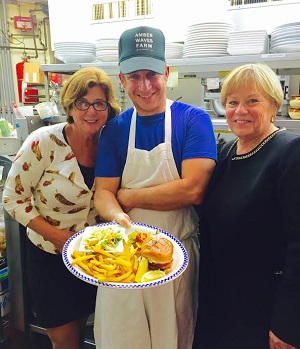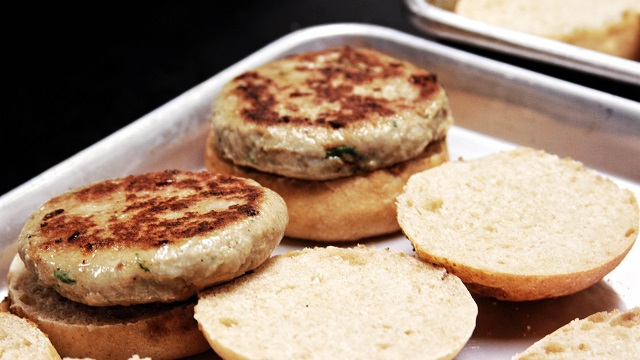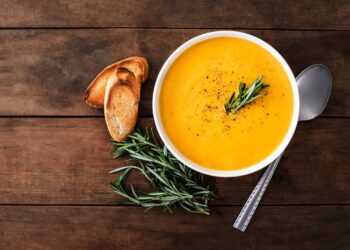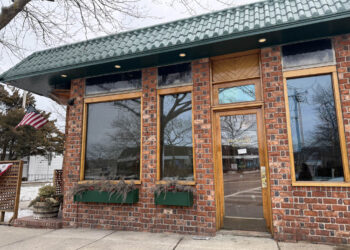A group of extraordinary East End chefs have joined forces in the kitchen for The Montauk Fishburger Project, an initiative that aims to familiarize local elementary and high school students with one of the area’s plentiful, nutritious resources, which is being conscientiously harvested under firm federal and state fisheries management regulations, incredibly close to home. The program is being pioneered by the founding members of Dock to Dish, the first Restaurant Supported Fishery program in the U.S., who have now established the inaugural partnership with The Long Island Commercial Fishing Association and the Bridgehampton Edible School Garden program, with the goal of making wild, sustainable, traceable local seafood readily available to East End youth.
 |
|
Judiann Carmack-Fayyaz and chef Jason Weiner showcase a Montauk Fishburger with locally sourced sides and toppings at Almond Restaurant, with Bridgehampton School Superintendent Dr. Lois Favre. (Courtesy Photo) |
“We are in the middle of a movement to bring back our long lost farming and fishing culture here on the East End,” shared program founder Joseph Realmuto, chef and owner at The Honest Man Restaurant Group. “Two things that have stood in the way of returning local seafood to our households and school system has been the amount of labor that goes into preparing fish dishes, along with a resistance from younger people to try foods that they are unfamiliar with.” The initiative introduces the students to the local ingredient using an ingenious delivery. “The Montauk Fishburger Project finally solves those problems,” explained Realmuto. “We can create them with a relatively low amount of labor and, more importantly, the fishburgers are delicious. In the end, good taste and flavor are absolutely mandatory requirements to successfully convincing students not only to try, but to actually like, and to continue eating healthy dishes.”
Plans for the pilot program revealed that The Montauk Fishburger Project will start distribution to over 250 students in the Bridgehampton school system this month. The prototype fishburger was created using an adaptation of a recipe provided by chef Eric Ripert of Le Bernardin, and features solely local species of wild finfish that are regarded as sustainable by the National Oceanic and Atmospheric Association. Of course the meal’s centerpiece needs a sidekick and this Hamptons inspired version comes on a bun that contains organic flour from indigenous strains of wheat that were locally grown and harvested at Amber Waves Farm in Amagansett. The buns were crafted from a blueprint for sustainable bread that was designed by chef and author, Dan Barber, of Blue Hill Restaurants. Aquacultured kelp from the Long Island Sound, that was grown and harvested by ocean farmer Bren Smith in the Thimble Islands, complete the fishburger.
Another initiative founder, Stefanie Sacks, a culinary nutritionist, Montauk-based radio host, and author of the popular local food advocacy book “What The Fork Are You Eating,” also stressed the importance of exposing students to local bounty. “Reconnecting our local school systems with steady, reliable access to the incredibly robust bounty of nutrient-dense wild seafood being landed right here in New York’s largest fishing port has been a goal of east end communities for many decades,” noted Sacks. “The hardest part was that we first had to figure out a way to turn what was local and abundant and most nutritious, into something the students would find to be totally delicious.” She hopes the program will spread throughout the East End. “The chefs have now solved that problem, in a big way, and the Montauk Fishburger Project has suddenly opened the door to a new model that we envision will become commonplace throughout school systems across the state in the coming years,” Sacks added.
 |
|
The fishburger features solely local species of wild finfish. (Photo: Emy Kane) |
Bonnie Brady, Executive Director of the Long Island Commercial Fishing Association, is pleased that the project will support the local fishing community. “In the U.S. marketplace over ninety percent of seafood is imported and more than half of it is farmed seafood, mostly from Asia,” said Brady. “It is imperative to allow our remaining commercial fishermen here to return to their historical and critically important role as providers of locally landed seafood to New York State residents.” The Montauk Fishburger Project is a win-win for both the students who get to enjoy the tasty fare and the food purveyors who provide the ingredients. “In this program we are honoring a local tradition and preserving our connections to surrounding communities,” explained Brady. “By having the chefs collaborate and create the fishburger format using our local catch, we have combined the best of both the culinary and the commercial fishing worlds.” She had high praise for the chefs’ innovate way of teaching youth about the beloved seafood. “For serving students, the chefs were very smart to use a familiar food item like the burger, which we expect will be a big hit with the kids,” Brady noted. “This enables us to now provide high quality servings of healthy, local protein to a larger sector of the local population than ever before.”












